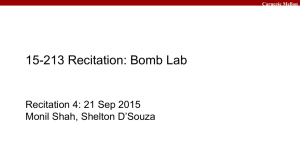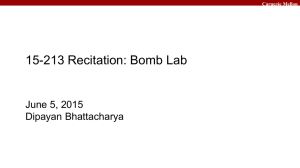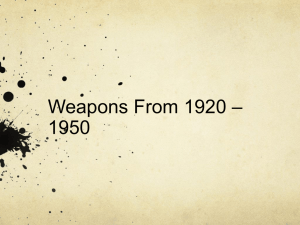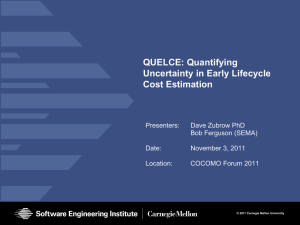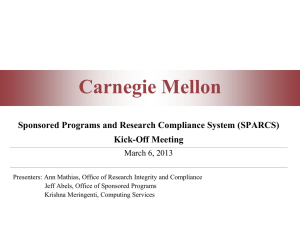rec4 - Andrew.cmu.edu
advertisement
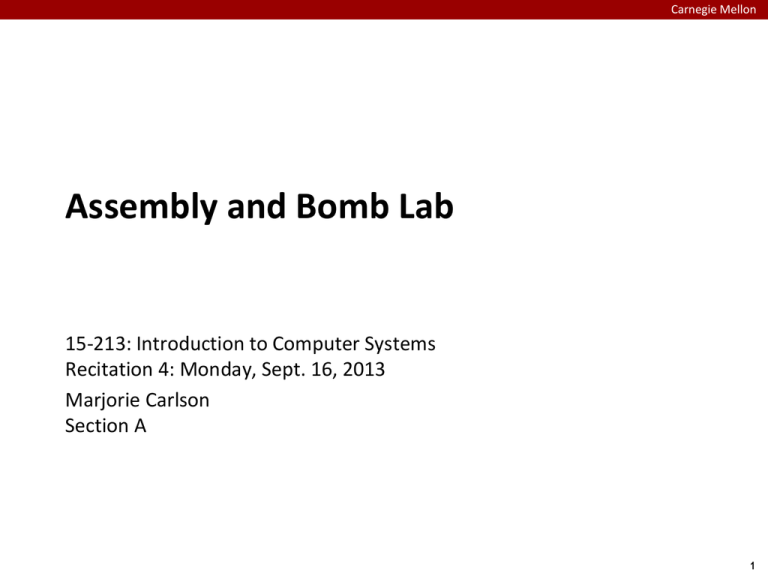
Carnegie Mellon Assembly and Bomb Lab 15-213: Introduction to Computer Systems Recitation 4: Monday, Sept. 16, 2013 Marjorie Carlson Section A 1 Carnegie Mellon Agenda Overview of Bomb Lab Assembly Refresher Intro to GDB Unix Refresher Bomb Lab Demo 2 Carnegie Mellon Bomb Lab Oh no! Dr. Evil has written an evil program that will “explode” the Shark machines! The program is in phases, each of which reads in input – something like a password – from standard input. If your input is correct, you go on to the next phase. If not, the bomb explodes. The program prints “BOOM!!!” and terminates, and you lose half a point. (Your score is updated automatically – you don’t have to upload anything to Autolab.) 3 Carnegie Mellon Bomb Lab We give you: Partial source code, in which Dr. Evil mocks you The executable file itself You can’t read the C source code. So how can you figure out what the program does? From the binary executable! 4 Carnegie Mellon Agenda Overview of Bomb Lab Assembly Refresher Intro to GDB Unix Refresher Bomb Lab Demo 5 Carnegie Mellon x86-64 Integer Registers %rax return %rbx %eax %r8 arg 5 %r8d %ebx %r9 arg 6 %r9d %rcx arg 4 %ecx %r10 %r10d %rdx arg 3 %edx %r11 %r11d %rsi arg 2 %esi %r12 %r12d %rdi arg 1 %edi %r13 %r13d %rsp %esp %r14 %r14d %rbp %ebp %r15 %r15d 6 Carnegie Mellon Assembly: Operands Data type Syntax Examples Notes Start with $ $0x0 $-15213 Don’t forget 0x means hex! Registers Start with % %esi %rax Can represent a value or an address Memory locations Parentheses around a register, or addressing mode – D(Rb,Ri,S) Immediate values (constant integers) (%esi) 0x8(%rax) (%rax, %rsi, 4) Parentheses dereference. If %esi stores an address, (%esi) is the value at that address. 7 Carnegie Mellon Assembly: Some Common Operations Instruction Effect mov %rdi, %rax rax = rdi add %rdi, %rax rax = rax + rdi sub %rdi, %rax rax = rax - rdi lea (%rdi, %rsi, 2), %rax rax = rdi + (2 * rsi) (doesn’t dereference) call foo Calls function “foo” push %eax Pushes eax onto the stack pop %eax Pops a value off the stack and into eax ret Returns to the return address (i.e., the next line in the calling function) nop Does nothing! You may see suffixes on the end: b, w, l, q Specify operand is 1, 2, 4, 8 bytes 8 Carnegie Mellon Assembly: Comparisons and Jumps Remember from class that Assembly uses comparisons and jumps (gotos) to execute various conditionals and loops. cmp b, a sets the same flags as computing a – b. test b, a sets the same flags as computing a & b. These are usually followed by a conditional jump instruction that relies on the results. Watch out for operand order: cmpl %eax, %edx jg 401095 if %edx > %eax, jump to 401095 9 Carnegie Mellon Assembly: Comparisons and Jumps Instructio n Effect Instructio n Effect jmp Always jump ja Jump if above (unsigned >) je/jz Jump if =/0 jae Jump if above or equal jne/jnz Jump if ≠/0 jb Jump if below (unsigned <) jg Jump if > jbe Jump if below or equal jge Jump if >= js Jump if negative jl Jump if < jns Jump if nonnegative jle Jump if <= 10 Carnegie Mellon Assembly: Comparisons and Jumps cmp $0x42, %edi je 400d3b edi == 66 if ____________, jump to 400d3b cmp %esi, %edx jle 400e71 edx <= esi if_____________, jump to 400e71 test %rdi, %rdi jne 400e87 if ____________, jump to 400e87 %rdi != 0 11 Carnegie Mellon Agenda Overview of Bomb Lab Assembly Refresher Intro to GDB Unix Refresher Bomb Lab Demo 12 Carnegie Mellon Your Defusing Toolkit objdump –t bomb prints the symbol table strings bomb prints all printable strings objdump –d bomb prints the Assembly gdb bomb shows you the executable file in Assembly and lets you step through it line by line, peeking into the registers and stack as you go All the GDB commands you need are in http://csapp.cs.cmu.edu/public/docs/gdbnotes-x86-64.pdf 13 Carnegie Mellon GDB: Stepping Through Code break <location> sets a breakpoint. Location can be a function name or an address. Pro tip: you have to reset your break points when you restart GDB! run / run <filename> runs the program up till the next breakpoint. Pro tip: instead of typing in your inputs each time, you can put them in a text file, one per line, and run that. disassemble (or disas – but not dis!!!) shows you the current function, with an arrow to the next line. step / stepi / nexti step stepi nexti stepi executes one C statement – it doesn’t work for us. steps to the next line of Assembly. does the same but doesn’t stop in function calls. <n> or nexti <n> steps through n lines. 14 Carnegie Mellon GDB: Examining Data info registers prints the (hex) contents of every register. print $<register> prints the contents of a register. Note the $ – not a %. Use /x or /d, to specify hex or decimal: print /d $rax. x $<register> / x 0x<address> prints what the register points to (or what’s at the given address). By default, prints one word (a “word” here is 4 bytes). However, in addition to specifying format (now including /s, string), you can specify how many objects of what size to print, in the format x /[num][size][format], for example: x /4wd $rsp 15 Carnegie Mellon One Last Hint: sscanf The bomb frequently calls sscanf to read in formatted arguments. If you’re not familiar with the formatting used by printf, now’s the time! Example: %s %x %s represents an input of a string, hex number, and string. This could be handy in figuring out what kinds of arguments a phase is expecting. man sscanf! 16 Carnegie Mellon Resources Assignment writeup GDB cheat sheet: http://csapp.cs.cmu.edu/public/docs/gdbnotes-x86-64.pdf. CS:APP Chapter 3 If you’re stuck, check the course FAQ: http://www.cs.cmu.edu/~213/faq.html If that doesn’t help, email us: 15-213-staff@cs.cmu.edu Office hours: Sun-Thu, 5:30-8:30 pm, in Wean 5207 Peer tutoring: Tue 8:30-11, Mudge Reading Room Note: if you Google Assembly instructions, make sure what you find is in AT&T syntax, not Intel. (The operands are reversed.) 17 Carnegie Mellon Agenda Overview of Bomb Lab Assembly Refresher Intro to GDB Unix Refresher Bomb Lab Demo 18 Carnegie Mellon Unix Refresher At the very least, you should be comfortable with: man to read manual pages cd to change directories ls to list contents of the current directory ls –l to list contents with extra info, including permission bits scp to send files between your computer and the Shark machines ssh to log into the Shark machines tar to tar (-cvf) and untar (-xvf) things (-z for optional gzip) chmod to change permission bits if necessary flags (e.g. –R to apply a command recursively to a folder) Helpful hints: Tab autocompletes. An up arrow scrolls up through your last few commands. 19 Carnegie Mellon Agenda Overview of Bomb Lab Assembly Refresher Intro to GDB Unix Refresher Bomb Lab Demo 20
